A few weeks ago, I was at the Kennedy Space Center, reporting on the last scheduled night launch of the Space Shuttle program. Endeavour lifted off into the false dawn that she herself created, and rose majestically into the sky, lighting up the wispy cloud layer that was creeping onshore. It was one of the most beautiful space launches I have ever experienced. There are only four more Shuttle launches, before the end of Her Era.
Space Shuttle was born out of this nation, coming off of the highs of Apollo, Skylab, and the Apollo-Soyuz Test Project. Her proponents promised inexpensive, regular access to space, aboard this then modern-day “space truck.” These were lofty goals to be sure, that we never got close to reaching. Instead of fifty-odd flights a year, the best we did was just south of ten. Instead of inexpensive flights, each costs somewhere north of five hundred million dollars.
Nevertheless, Space Shuttle is a magnificent flying machine, unparalleled in the history of human spaceflight. The Soviet Union tried to copy her, and failed; their program consisted of exactly one unmanned flight, which ended after one orbit. No other program featured an operational vehicle, which launched into orbit on her own power, loitered in space for two-plus weeks, re-entered Earth’s atmosphere, and landed on a conventional runway like an airplane. No other manned vehicle could even come close to carrying her nearly-sixty-thousand-pound payload capacity. There has never been another operational reusable space system, ever.
When she is put out to pasture, we will have nothing new with which to replace her; after she is decommissioned, the United States will have no independent means to launch astronauts into space. It is unclear when we will have a new crew vehicle, the only thing certain is that we will have a capability gap that will last at least five years, and probably longer.
I was a member of the Review of US Human Spaceflight Plans Committee, chaired by aerospace veteran, Norm Augustine. Appointed by the White House, we worked last summer to evaluate plans and formulate options for the new Administration. It was a difficult conclusion to accept, but we found nothing, not even practically unlimited funding, would minimize the gap between the Space Shuttle and the next US crewed space vehicle, except for extending Shuttle operational life. So then, why is the Space Shuttle going away? Three reasons: She is too expensive to operate, there is a higher risk involved in Shuttle flights than we originally calculated, and because of the last reason, it is politically untenable.
The Augustine Committee, as we came to be known, put forward the option to spur development of commercial, crewed Low Earth Orbit (LEO) access. Why does this make any sense? Commercial may not reduce the gap, but it may offer a better long-term solution for LEO access, since by definition, commercial solutions need to be cost effective, and government systems do not. The technology to get astronauts to LEO has existed for nearly fifty years. The trick is to find a safe, yet commercially viable structure. I didn’t foresee the recent announcement of the cancellation of the NASA Orion crew exploration vehicle (CEV); the commercial option was for LEO access, not exploration. I expected that CEV, along with either a heavy lift vehicle, or a man-rated expendable launcher would serve as a complimentary system to commercial LEO efforts. Details of the US plans for the future of NASA human spaceflight remain to be revealed, but I remain cautiously optimistic. Sometimes it takes dramatic change, even temporary chaos, to affect the possibility of a quantum jump in improvement.
I flew on three Space Shuttles: Columbia, Endeavour and Discovery. This is a bold, new world, but Shuttle will always have a special place in my heart. I will remember them fondly, and I will miss them.
Leroy Chiao
Devon Island Expedition
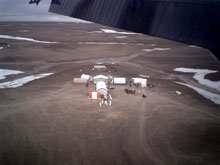
This blog features educational updates on my Devon Island Expedition of July 14-20, 2007. Other sites: spaceref.com/blogs/earthclassroom, www.marsonearth.org

Sunday, March 7, 2010
Subscribe to:
Post Comments (Atom)

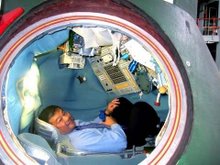
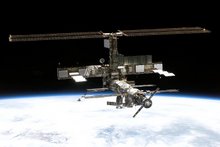
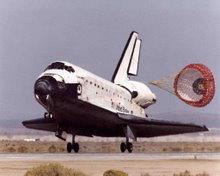
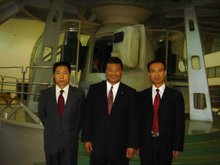
No comments:
Post a Comment